In this article:
A basic skin care regimen includes washing the face with a cleanser, toning, moisturizing, and safeguarding your face from the sun rays. It is important to utilize products appropriate for your skin type and to incorporate active ingredients to address specific skin concerns you battle with.
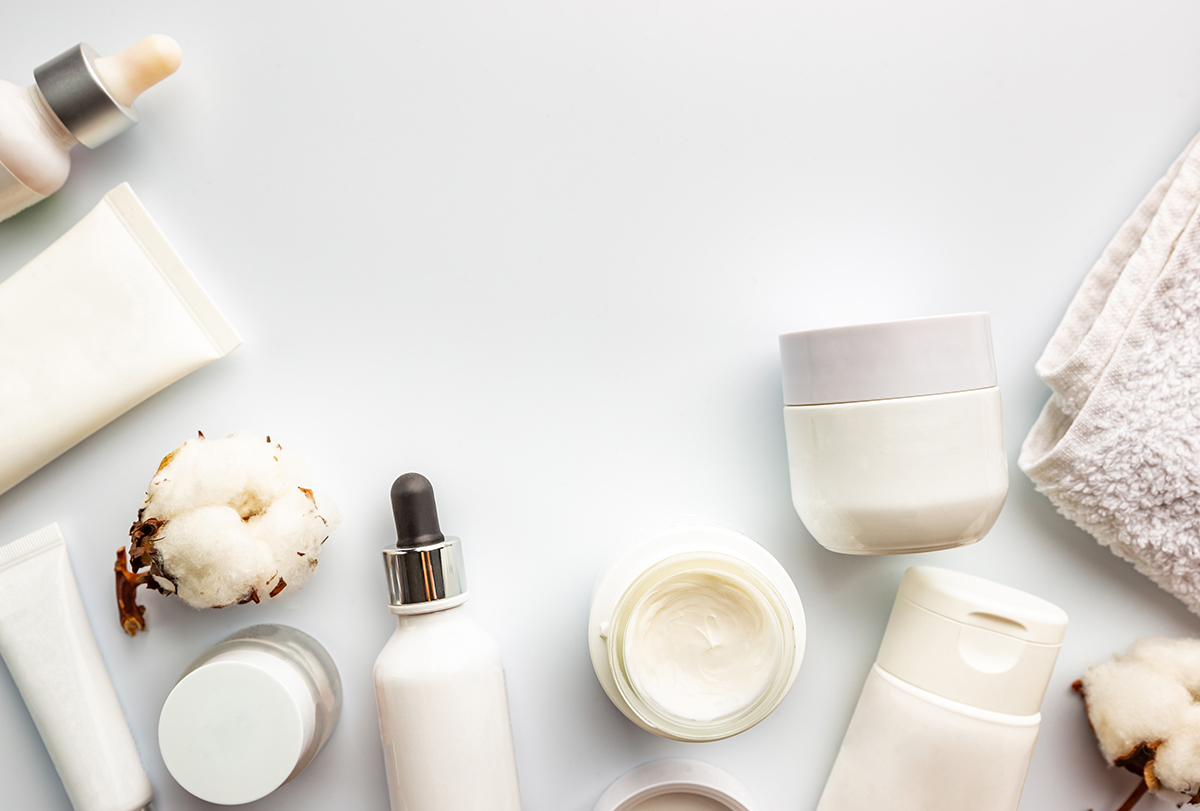
Proper skin care is vital in preserving skin health and discouraging early aging.
If you are planning a specific skin care routine to achieve healthy, flawless skin, you may find yourself wondering what products to buy and how they are different from one another, especially products that seem to have similar uses such as face oils, face serums, and moisturizers.
Don’t worry! All you have to do is read on to find out about how they are different and their roles in your skin care routine.
Face Serums Versus Face Oils Versus Face Moisturizers: What Are the Differences?
| FACTOR | FACE SERUMS | FACE OILS | FACE MOISTURIZERS |
|---|---|---|---|
| Consistency: | Lightweight with a thin consistency | Lightweight but viscous consistency | Creamy with a thick consistency |
| Use/purpose: | Treating skin concerns and providing hydration | Nourishing the skin | Hydrating the skin |
| Composition: | Very concentrated active ingredients | Plant extracts and essential oils | Emollients |
| Absorption time: | Quick absorption | Allow absorption | Slow absorption |
| Skin care regimen: | Apply after toner and before moisturizer | Apply after serum and moisturizer | The final step of skin care |
| Benefits: | Address skin problems such as signs of aging and acne | Improve skin texture and radiance | Hydrates and protects the skin |
| Suitability: | All skin types, depending on use | Dry skin or mature skin | All skin types |
| Frequency of use: | 1–2 times/day | 1–2 times/day | 1–2 times/day |
Which Should I Choose?
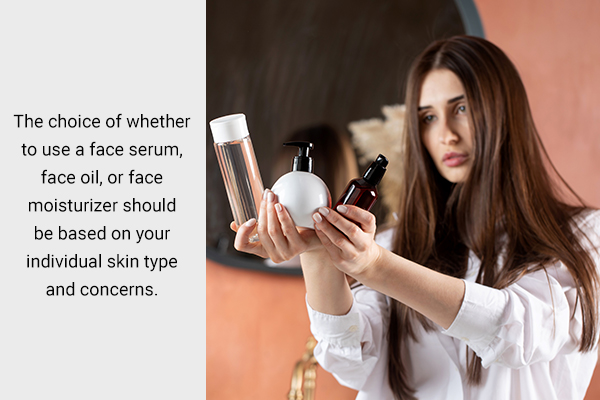
When deciding between a face serum, face oil, or face moisturizer, it’s important to consider your skin type and specific concerns.
Face serums are weightless and contain a high concentration of active components. They are ideal for targeting various issues such as wrinkles, dark spots from hyperpigmentation, and uneven appearance of the skin.
Face oils, with their thicker consistency, are great for dry or dehydrated skin. They provide extra hydration and can protect the skin from environmental stressors.
Face moisturizers, on the other hand, are suitable for all skin types. They provide general hydration and assist in the maintenance of skin health and appearance.
In summary, the choice of whether to use a face serum, face oil, or face moisturizer should be based on your individual skin type and concerns.
What Are Face Serums?
Face serums are light, quick-absorbing solutions that penetrate deeper into the skin than moisturizers. They contain a high concentration of active ingredients that target specific skin concerns.
Serums can be oil or water-based and are used only in tiny amounts using a dropper or pump dispenser. Their lightweight consistency allows for quick absorption and delivery of active ingredients to the deeper layers of the skin. (1)
Apply serums after cleansing, before applying moisturizer or sunscreen, to maximize the benefits of the active ingredients.
The benefits of serums include:
- Many face serums are formulated with hydrating ingredients such as hyaluronic acid and glycerin, which can help to boost the skin’s moisture levels and prevent dryness. (1)(2)
- Antiaging serums may contain retinol, vitamin C, and peptides, which reduce fine lines and wrinkles. (3)(4)
- Brightening serums use ingredients such as vitamin C and niacinamide to improve skin tone and decrease dark spots. (3)(5)
What Are Face Oils?
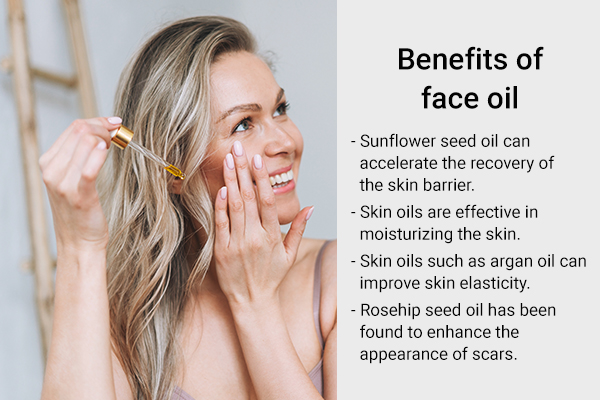
Face oils are natural plant-based oils that offer various benefits for the skin. They contain specific compounds such as antimicrobials and antioxidants that can provide advantages to the skin.
These oils are particularly beneficial for individuals with dry or inflammatory skin conditions as they can soothe and hydrate the skin, thus improving the symptoms associated with these conditions.
It’s important to note that the unique characteristics of different oils should be taken into consideration when choosing an oil for topical skin care. (6)
Some commonly used oils include olive oil, sunflower seed oil, coconut oil, jojoba oil, oat oil, and argan oil. (7)
Face oils provide the following benefits:
- Research has shown that a single application of sunflower seed oil can accelerate the recovery of the skin barrier within 1 hour of application and this effect can last for up to 5 hours. (8)(9)
- These oils contain lipids that act as a protective barrier, preventing moisture loss and safeguarding the skin from environmental factors. (10)
- Skin oils are also effective in moisturizing the skin, with experts supporting their efficacy in reducing skin dryness.
- Skin oils such as argan oil can improve skin elasticity, giving the skin a younger and fuller appearance. (11)
- Rosehip seed oil has been found to enhance the appearance of scars, reducing pigmentation and improving scar softness and flexibility. (12)
What Are Face Moisturizers?
Moisturizers are skin care products that help increase the water content of the skin. They contain ingredients that prevent water loss from the skin’s surface.
Moisturizers come in different forms, such as creams, lotions, and ointments. The use of a moisturizer can help to improve the overall health and appearance of the skin, as well as provide relief from symptoms of dryness, itching, and flaking. (13)
One of the most common ingredients found in moisturizers are humectants that help attract and retain moisture in the skin, such as glycolic acid, lactic acid, and mandelic acid.
Emollients and occlusives are also present in moisturizers; they help to form a barrier on the skin to prevent moisture loss. (13)
The benefits of using face moisturizers include improved hydration, protection from environmental factors, antiaging effects, soothing of irritated skin, and enhanced skin barrier function. (13)(14)
Disadvantages of Using Facial Products Such as Oils, Serums, and Moisturizers
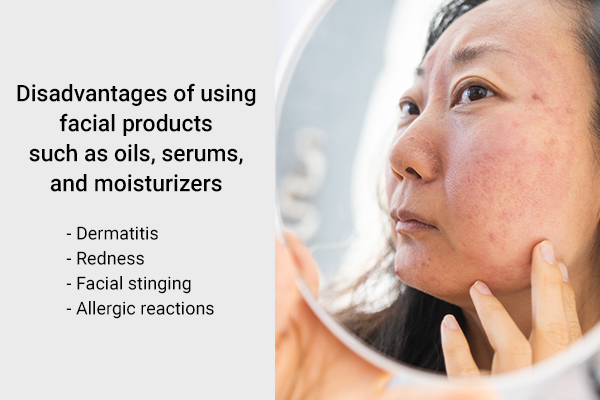
It’s true that cosmetic items can have negative side effects, and some of the common health risks associated with their use include: (15)
- Allergic reactions – Cosmetics can contain various ingredients such as scents or dyes that may cause an allergic reaction.
- Facial stinging – Some cosmetic products, particularly those that contain exfoliating ingredients or are designed for sensitive skin, may cause a stinging or burning sensation when applied to the face.
- Redness – Cosmetics can also cause skin redness, particularly in people with sensitive skin. This may be due to the irritation caused by certain ingredients or harsh exfoliants.
- Dermatitis – Irritant dermatitis, a type of skin inflammation, is one of the most prevalent adverse effects of cosmetics.
Note: Avoid using expired or contaminated products. Also, if you experience any adverse effects from a cosmetic product, stop using it and consult a healthcare professional if necessary. (15)
How to Use Face Serums?
To use a face serum:
- Cleanse your facial skin.
- Apply a toner, if needed.
- Take a little quantity of serum and apply it to your face.
- Gently massage the product into your skin. Ensure even distribution throughout, and allow the serum to be absorbed into your skin.
- Apply a moisturizer.
- Apply sunscreen during the daytime.
How to Use Face Oils?
To apply face oil:
- Cleanse your face to remove any impurities.
- Dispense a few drops of oil onto your finger. Rub the oil between your hands.
- Massage the oil into your skin.
- Allow the oil to be completely absorbed.
How to Use Face Moisturizers?
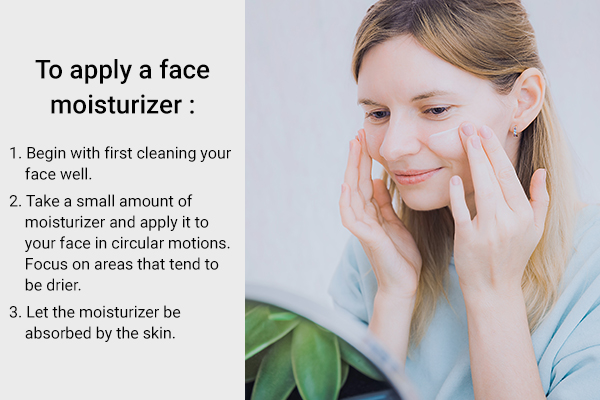
To apply a face moisturizer:
- Begin with first cleaning your face well.
- Take a small amount of moisturizer and apply it to your face in circular motions. Focus on areas that tend to be drier.
- Let the moisturizer be absorbed by the skin.
How Do I Use These Products Together in My Skin Care Routine?
Start by cleansing your face with a suitable face wash for your skin, and then some dab toner. After 1–2 minutes, apply a face serum, face oil, and face moisturizer following these steps:
- Apply a small amount of face serum and massage your clean skin with it. Give it a few seconds to be absorbed.
- Massage your face with face oil. Wait for a few seconds for the oil to be absorbed.
- Apply a layer of face moisturizer.
Do You Get Additional Benefits if You Use All Three Products?
Yes, incorporating all three – face serum, face oil, and face moisturizer – into your skin care routine can provide your skin with extra benefits.
Research suggests that implementing a comprehensive skin care routine that includes products such as face serums, face oils, and face moisturizers can provide extra benefits for your skin.
In a study, participants who followed the advanced routine (including cleanser, toner, eye cream, serum, and day and night cream) saw improvements in hydration, skin texture, pore size, brightness, and wrinkles compared to those using a simple routine (cleanser and day cream). (16)
Most-Asked Questions
How often should I use a face serum?
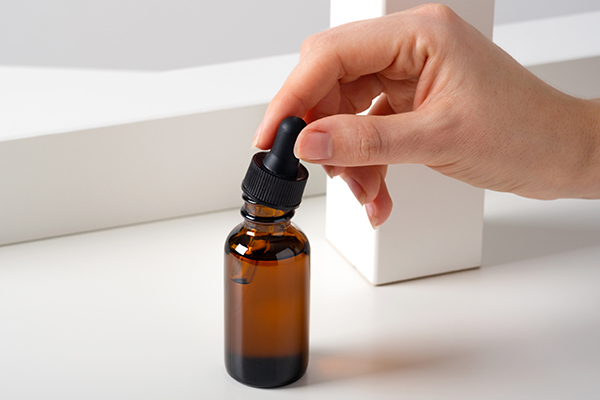
Most dermatologists recommend using a serum once or twice daily, typically after cleansing and toning the skin.
Research has found that using a serum containing hyaluronic acid twice daily for 8 weeks improved skin hydration and texture. (17)
Can face serums cause skin irritation?
In rare cases, some people may encounter skin irritation or allergic responses to certain components in the serums. Generally, they are safe.
A study found that a serum containing vitamin C and other antioxidants was well tolerated by the participants with sensitive skin. (18) So, irritation depends on the individual’s skin.
Can face serums be used on all skin types?
Most face serums are formulated to work on all skin types, but some may be better suited for certain skin types. For example, a serum containing hyaluronic acid can be particularly helpful for those with dry skin.
A study found that a serum containing niacinamide was safe for use on all skin types, including sensitive skin. (19)
How often should I utilize face oil?
It can be used daily or a few times a week based on your skin tolerance.
Can I use a face oil, even if I have oily skin?
Yes, you can use face oil even if you have oily skin, but it’s crucial to select a lightweight, noncomedogenic oil.
Final Word
Face serums, face oils, and face moisturizers are all important components of a good skin care routine, and each has unique benefits.
Face serums are packed with active ingredients that fight skin concerns. Face oils are great sources of hydration and can improve skin elasticity. Face moisturizers help to improve the skin’s barrier function and prevent water loss.
Choosing the right product depends on individual skin concerns, preferences, and skin type.
- Was this article helpful?
- YES, THANKS!NOT REALLY


